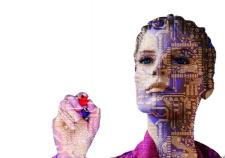Forget Ideology, Liberal Democracy’s Newest Threats Come From Technology and Bioscience
By John Naughton,
The Guardian
| 08. 28. 2016
The BBC Reith Lectures in 1967 were given by Edmund Leach, a Cambridge social anthropologist. “Men have become like gods,” Leach began. “Isn’t it about time that we understood our divinity? Science offers us total mastery over our environment and over our destiny, yet instead of rejoicing we feel deeply afraid.”
That was nearly half a century ago, and yet Leach’s opening lines could easily apply to today. He was speaking before the internet had been built and long before the human genome had been decoded, and so his claim about men becoming “like gods” seems relatively modest compared with the capabilities that molecular biology and computing have subsequently bestowed upon us. Our science-based culture is the most powerful in history, and it is ceaselessly researching, exploring, developing and growing. But in recent times it seems to have also become plagued with existential angst as the implications of human ingenuity begin to be (dimly) glimpsed.
The title that Leach chose for his Reith Lecture – A Runaway World – captures our zeitgeist too. At any rate, we are also increasingly...
Related Articles
By Jonathan Matthews, GMWatch | 12.11.2025
In our first article in this series, we investigated the dark PR tactics that have accompanied Colossal Bioscience’s de-extinction disinformation campaign, in which transgenic cloned grey wolves have been showcased to the world as resurrected dire wolves – a...
By Katie Hunt, CNN | 07.30.2025
Scientists are exploring ways to mimic the origins of human life without two fundamental components: sperm and egg.
They are coaxing clusters of stem cells – programmable cells that can transform into many different specialized cell types – to form...
By John H. Evans, Craig Callender, Neal K. Devaraj, Farren J. Isaacs, and Gregory E. Kaebnick, Issues in Science and Technology | 07.04.2025
The controversy around a ban on “mirror life” should lead to a more nuanced public conversation about how to manage the benefits and risks of precursor biotechnologies.
About five years ago, the five of us formed a discussion group to...
By Pallab Gosh and Gwyndaf Hughes, BBC News | 06.26.2025
Work has begun on a controversial project to create the building blocks of human life from scratch, in what is believed to be a world first.
The research has been taboo until now because of concerns it could lead to...




